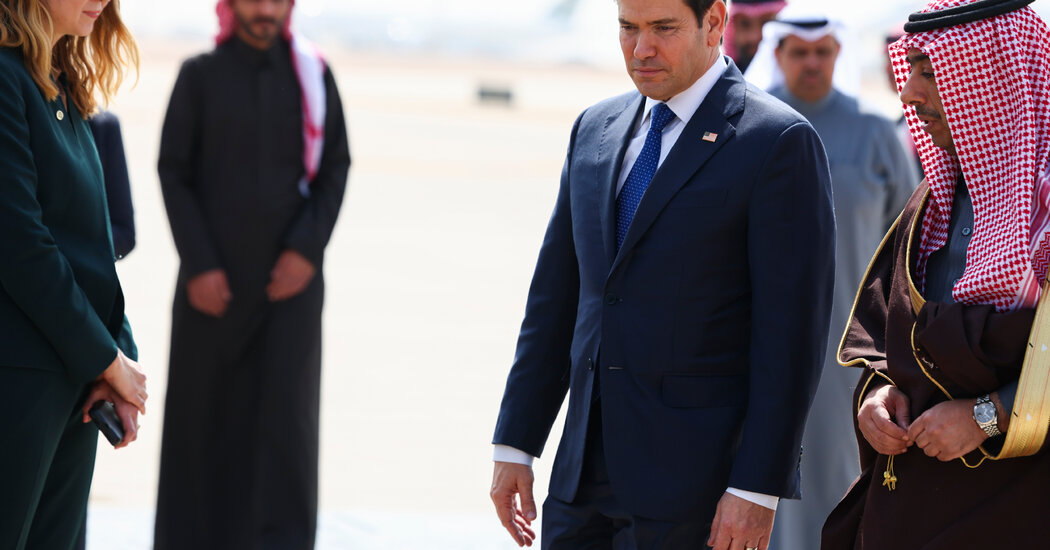The de facto leader of Saudi Arabia, Crown Prince Mohammed bin Salman, met on Monday with three senior members of the Trump administration, including Secretary of State Marco Rubio, who were visiting the kingdom to discuss the future of both Gaza and Ukraine.
The visit of Mr. Rubio, National Security Adviser Mike Waltz and Steve Witkoff, Mr. Trump’s Mideast envoy, came amid criticism that the Trump administration was acting without consulting relevant foreign partners about the wars in both countries.
Mr. Rubio also met earlier in the day with Faisal bin Farhan, the Saudi foreign minister.
Little was released about the content of the meetings, except for a video of a brief exchange between the men in which the prince said he was glad to work with the Trump administration.
Mr. Rubio, who flew to Riyadh from Israel, and his colleagues were expected to press the Saudi leadership to propose a vision for postwar Gaza. President Trump’s idea to depopulate and occupy the territory has spurred widespread opposition in the Arab world, including in Saudi Arabia. That has led Mr. Rubio and other U.S. officials to encourage Arab leaders to suggest an alternative.
The three U.S. envoys were also scheduled to meet in Riyadh on Tuesday with Russian officials to discuss the future of the Russia-Ukraine war.
In addition to angering Arab allies with his contentious proposal for Gaza, Mr. Trump frustrated partners in Europe when he spoke last week unilaterally with President Vladimir V. Putin of Russia about Ukraine’s future. His administration has also said that European governments will play no role in future talks, despite the conflict taking place within Europe’s borders.
The moves prompted concern in Ukraine and elsewhere in Europe, where leaders fear being sidelined from discussions that will dictate their countries’ futures. Volodymyr Zelensky, the Ukrainian president, reiterated in an interview that aired on Sunday that his country would “never” accept a peace deal struck by the United States and Russia if Ukraine was not involved in the talks.
Mr. Rubio’s visit comes amid swirling uncertainty about the future of the cease-fire between Israel and Hamas in Gaza, as well as the long-term governance of the territory.
Israeli officials were expected to meet in Cairo on Monday to iron out disagreements about sending humanitarian aid, including temporary housing, such as tents and trailers, to Gaza. But the Israeli government has yet to decide whether to advance negotiations to extend the truce, which will lapse in early March unless Hamas and Israel restart talks. Israeli cabinet ministers were set to gather on Monday evening to debate the issue, but it was not certain that they would vote on it.
The Israeli leadership wants to avoid prolonging the truce if it allows Hamas to survive the war as a military force. But Hamas, though indicating a willingness to share administrative control of the territory, appears unwilling to disarm its military wing.
Mr. Trump has suggested ending the impasse by depopulating Gaza and sending its residents to Egypt and Jordan — a move strongly opposed by those countries as well as Saudi Arabia. The forced expulsion of Palestinians would be ethnic cleansing and a war crime, international law experts say.
The Trump administration’s proposal has created a further obstacle to Israel’s long-sought goal of normalizing diplomatic ties with Saudi Arabia. The Saudi leadership has said that it will not recognize Israel if Palestinians are displaced from Gaza, or if Israel refuses to create a pathway to Palestinian sovereignty.
The discussion grew more fraught after Benjamin Netanyahu, the Israeli prime minister, suggested that Saudi Arabia host Palestinian refugees and create a Palestinian state on Saudi soil.
Saudi Arabia’s Foreign Ministry rejected Mr. Netanyahu’s statements as those of “an extremist, occupying mind-set” that fails to understand the historical and cultural significance of Palestinian land.
Here’s what else is happening in the region:
The Israeli military said on Monday that it had killed a senior Hamas operative, Muhammad Shaheen, in a strike in Lebanon. Hamas has long maintained a presence in Lebanon and has often acted there in coordination with its Lebanese ally, Hezbollah. The strike came a day before a cease-fire in Lebanon between Israel and Hezbollah is set to elapse. Officials hope to extend the truce, even though Israel is expected to keep troops in several positions inside the Lebanese border past the deadline.
Gabby Sobelman contributed reporting from Rehovot, Israel, and Edward Wong contributed reporting from Washington.


